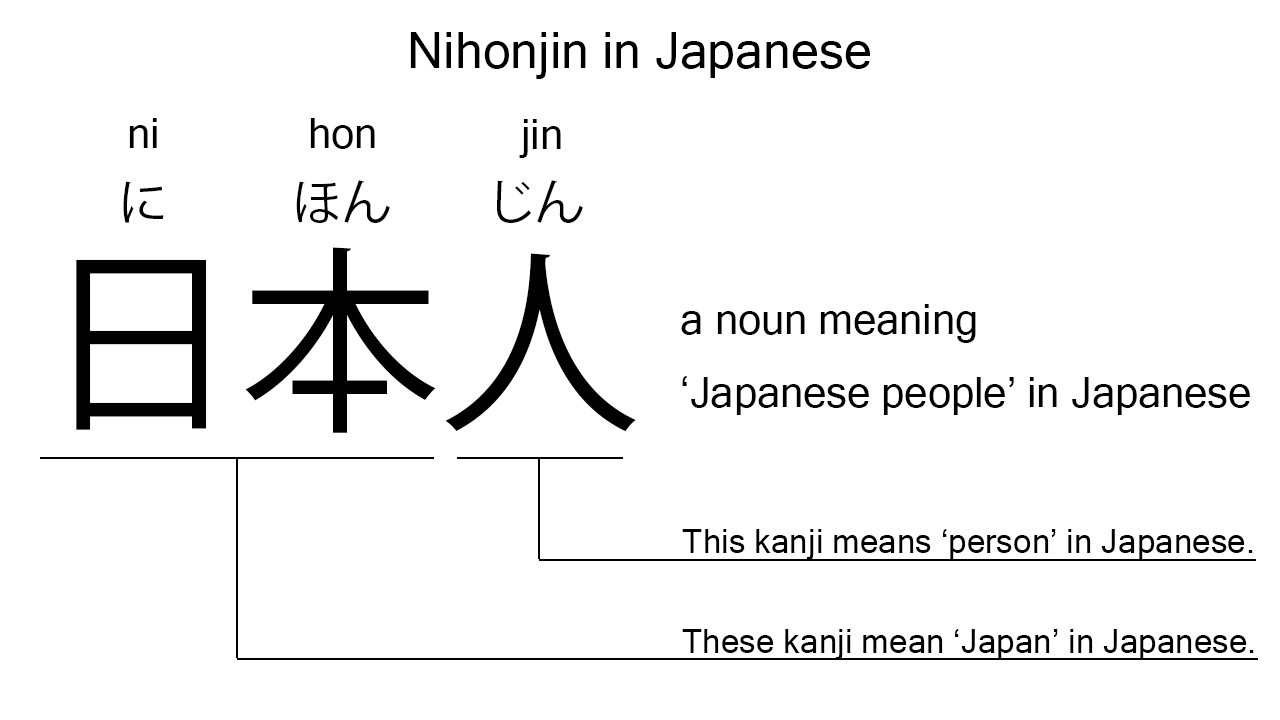What does “nihonjin” mean in Japanese?
Native speakers use nihonjin often to mean ‘Japanese people’ in Japanese. Perhaps, some Japanese learners know this word as it is sometimes used in Japanese textbooks. In this blog post, however, I will explain this word in detail based on its kanji expression. And also, I will explain how to use it through example sentences. My explanations would help Japanese learners understand nihonjin more clearly. Then, let’s get started!
Contents
Definition and meanings of “nihonjin”
Let me start with the definition and meanings of nihonjin.
- nihonjin – 日本人 (にほんじん) : a noun meaning ‘Japanese people’, ‘Japanese person’, or ‘the Japanese’ in Japanese. Learn more about Japanese plural and singular.
Japanese native speakers use this noun to refer to a person or people from Japan. So, its usage is very simple.
The definition and meanings are simple and clear. To understand this noun more clearly, however, let me explain its kanji expression in detail.
Nihonjin in kanji
The kanji expression of nihonjin consists of the following two parts:
- nihon – 日本 (にほん) : a noun meaning ‘Japan’ in Japanese. These two kanji characters literally mean ‘under the sun’ in Japanese. Japan is literally a country developed under the sun.
- jin – 人 (じん) : a suffix often used after a country name to add the meaning of a ‘person’ or ‘people’.
From these two parts, we can understand that nihonjin literally means ‘a person or people from Japan’ in Japanese. What the kanji characters express is, therefore, completely in line with the actual meanings.

When we meet new kanji expressions, we should check their kanji characters in detail to understand their meanings clearly and deeply. In many cases, kanji characters tell us a lot about the meanings of the expressions they form. Actually, here, we could get the better understanding of nihonjin through the detailed kanji check above.
So far, I’ve explained the definition and meanings of nihonjin together with its kanji characters. Then, let me explain how to use it through the example sentences below.
How to say “Japanese” in Japanese
kanojo wa nihonjin desu ka – 彼女は日本人ですか (かのじょはにほんじんですか)
Is she Japanese?
Below are the new words used in the example sentence.
- kanojo – 彼女 (かのじょ) : a pronoun meaning ‘she’ in Japanese.
- wa – は : a binding particle working as a case marker or topic marker. In the example, this works after kanojo to make the subject in the sentence.
- desu – です : an auxiliary verb used after a noun or adjective to make it polite. Probably, this is well known as a part of Japanese desu form. In the example, this is used after nihonjin to make it sound polite.
- ka – か : a sentence-ending particle used to make a question. As the definition suggests, this is used at the end of the example sentence to make the question. Normally, this is used with the pitch raised.
This is a typical usage of nihonjin. It literally means a ‘Japanese person’ in Japanese, but has been translated into English as ‘Japanese’ in this example.
Another example of “nihonjin”
「watashi wa nihonjin desu」to kanojo ga it ta – 「私は日本人です」と彼女が言った (「わたしはにほんじんです」とかのじょがいった)
“I’m Japanese,” she said.
Below are the new words used in the example sentence.
- watashi – 私 (わたし) : a pronoun meaning ‘I’ in Japanese.
- to – と : a case particle working as a quote marker. In the example, this works after the clause to indicate what she said.
- ga – が : a case particle used to make the subject word or the object word in a sentence. In the example, this is used after kanojo to make the subject in the sentence.
- it – 言っ (いっ) : one conjugation of the verb, iu, which means ‘to say’ in Japanese. In the example, it has been conjugated for the better connection with its following word.
- ta – た : an auxiliary verb used after a verb, adjective, or auxiliary verb to make its past tense form. In the example, this is used after it to make its past tense form, it ta.
This is another example of nihonjin. When we want to refer to people from Japan in Japanese, this noun is always a very good option.
Summary
In this blog post, I’ve explained the definition and meanings of nihonjin in detail based on its kanji expression. And also, I’ve explained how to use it through the example sentences. Let me summarize them as follows.
- nihonjin – 日本人 (にほんじん) : a noun meaning ‘Japanese people’, ‘Japanese person’, or ‘the Japanese’ in Japanese. Japanese native speakers use this noun to refer to a person or people from Japan. So, the usage is very simple. These three kanji characters literally mean ‘a person or people from Japan’ in Japanese. What the kanji characters express is, therefore, completely in line with the actual meanings.
Hope my explanations are understandable and helpful for Japanese learners.
Leave a Reply